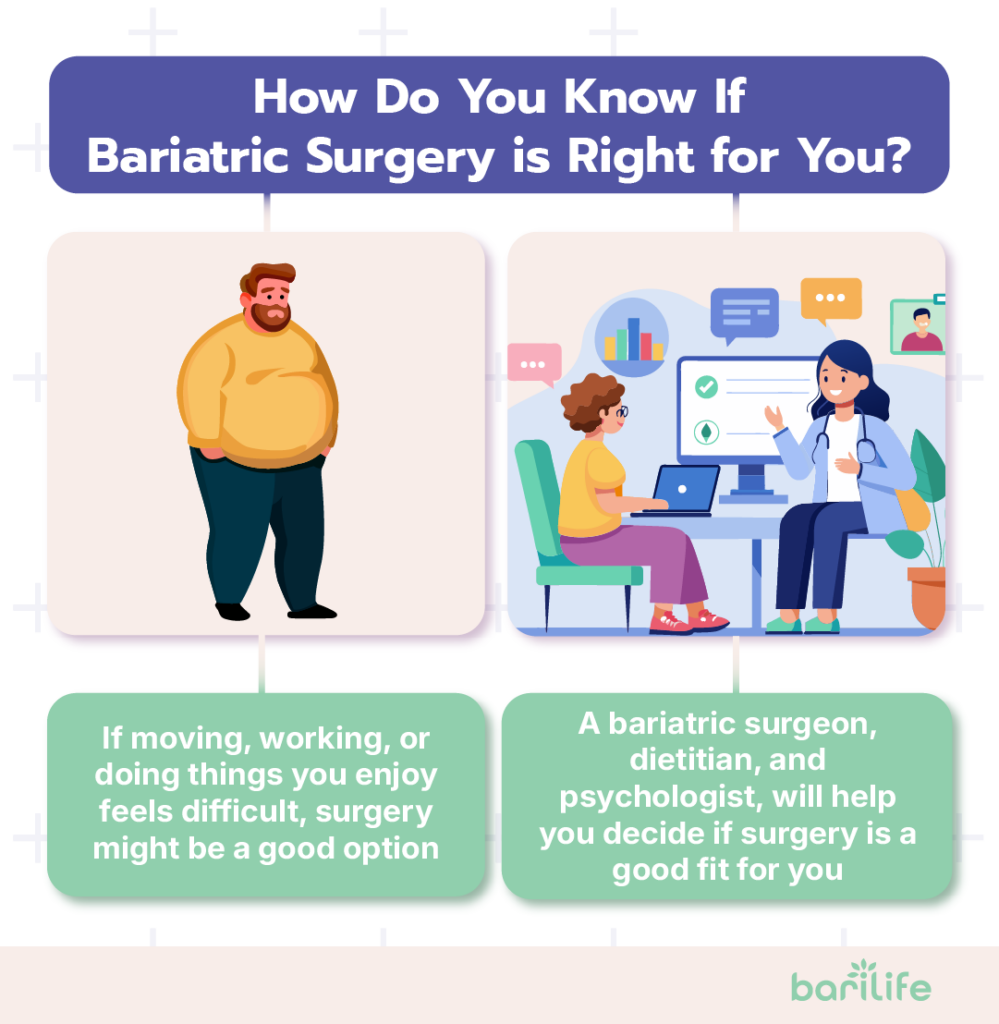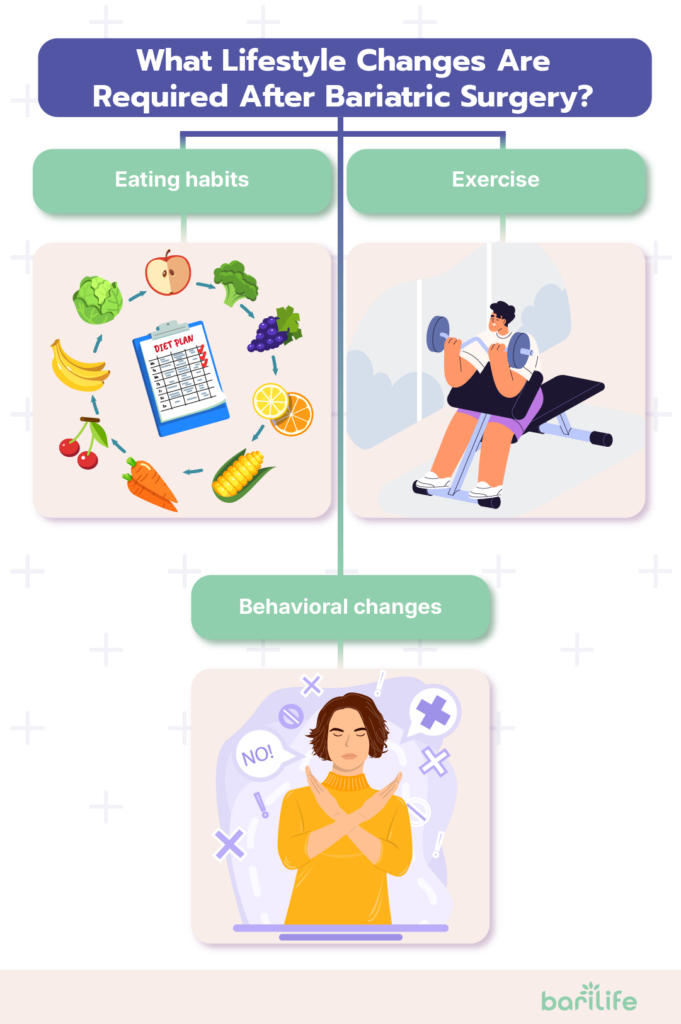Key Takeaways
- Bariatric surgery can be a life-changing option for individuals struggling with severe obesity and obesity-related health conditions, offering significant weight loss and improved overall health.
- Not everyone qualifies for bariatric surgery; eligibility depends on factors like BMI, health conditions, and commitment to lifelong lifestyle changes.
- Post-surgery success requires maintaining a healthy diet, regular exercise, and taking essential nutritional supplements to prevent deficiencies.
Deciding whether bariatric surgery is right for you is a big step that requires careful consideration. If you’ve been struggling with weight loss for years and traditional methods like diet and exercise haven’t worked, this procedure might be an option.
Bariatric surgery isn’t just about losing weight. It can help improve or even resolve obesity-related health conditions such as type 2 diabetes, sleep apnea, and high blood pressure. However, it’s not a quick fix and requires lifelong adjustments to your eating habits, physical activity, and medical care.
In this guide, we’ll cover who qualifies for bariatric surgery, what the process looks like, the expected results, and how it can impact your overall health.
What is bariatric surgery?

Bariatric surgery is a medical procedure designed to help individuals with severe obesity lose weight by altering the digestive system. It can also improve health conditions related to obesity, such as type two diabetes, high blood pressure, and heart disease.
There are several different bariatric surgeries:
Each type functions differently, either by reducing the size of the stomach or changing how the body absorbs nutrients.
Are You a Candidate for Bariatric Surgery?
Not everyone qualifies for bariatric surgery. Healthcare providers use specific guidelines to determine if you’re a good candidate.
Body Mass Index (BMI) is one of the most common measures used. A BMI of 40 or higher is generally considered an indication for surgery, but if you have a BMI of 35 or above with obesity-related health conditions such as type 2 diabetes or high blood pressure, you may still qualify.
Your weight loss history also matters. Have you tried dieting, exercising, or using medications to lose weight without long-term success? If so, surgery might be an option.
Most candidates are between 18 and 65 years old and must be in good enough health to undergo surgery and recover properly.
You also need to be ready to commit to lifelong lifestyle changes in how you eat and get regular physical activity.
If you meet these criteria, your healthcare provider may recommend further evaluation to determine if bariatric surgery is right for you.
How Do You Know If Bariatric Surgery is Right for You?
Choosing to have bariatric surgery is a big decision. If obesity-related conditions like type 2 diabetes, sleep apnea, or severe joint pain are affecting your daily life, surgery could help improve or even resolve these issues.
Beyond physical health, consider how your weight impacts your daily activities. If moving, working, or doing things you enjoy feels difficult, surgery might be a good option.

Equally important is your readiness for change. Are you prepared to follow a new way of eating and living for the rest of your life? Bariatric surgery is only successful when you commit to long-term lifestyle changes.
A medical team, including a bariatric surgeon, dietitian, and psychologist, will help you decide if surgery is a good fit for you.
What’s the First Step if You’re Considering Bariatric Surgery?
If you’re serious about bariatric surgery, the first step is gathering information and speaking with professionals.
Start by learning about the different types of bariatric surgery and what they involve. If you want insurance to pay for your surgery, call your insurance company and find out what your plan covers and what costs you may need to pay.
Talk to your primary care provider. They can help determine if you need a referral to a bariatric surgeon. Once referred, you will likely undergo medical evaluations, including blood work and imaging, to make sure you’re healthy enough for surgery.
Meeting with a nutritionist and psychologist is also part of the process. These experts will help you understand the lifestyle changes you need to make.
How Much Weight Can You Expect to Lose?
Weight loss after bariatric surgery varies from person to person. How much weight you lose depends on several factors, such as:
- Your baseline BMI
- Your age
- Your gender
- Your ethnicity
- If you have type 2 diabetes
- The type of procedure you have
The Centers for Disease Control and Prevention suggest that even a small amount of weight loss of 5% from your starting weight can have significant beneficial effects on your overall health.
What Lifestyle Changes Are Required After Bariatric Surgery?
Bariatric surgery is a tool, not a cure. To make it work, you’ll need to make long-term lifestyle changes.

- Eating habits: You’ll start with liquids, then move to soft foods, and eventually transition to small, healthy meals. High-fat, high-sugar foods should be avoided to ensure proper digestion and continued weight loss.
- Nutritional supplements: Since bariatric surgery can limit nutrient absorption, taking lifelong vitamins and minerals like vitamin B12, iron, and calcium is required.
- Exercise: You should begin with gentle movement and gradually increase activity, aiming for at least 150 minutes of exercise per week.
- Behavioral changes: Mindful eating, recognizing emotional eating triggers, and avoiding alcohol and smoking are all important.
- Tracking progress: Regular follow-up care with your doctor and nutritionist will help monitor your progress and keep you on track.
- Find community: Many people find that joining a support group provides motivation and guidance as they adjust to their new lifestyle.
What Health Conditions Can Bariatric Surgery Improve?
Research suggests that bariatric surgery can benefit overall health in several areas. It lowers the risk of heart attacks, strokes, and other cardiovascular events, especially in people with type 2 diabetes. For females, it reduces the risk of gestational diabetes and hypertension during pregnancy but can increase the risk of anemia.
Other areas it can improve include:
- Cardiovascular disease
- Diabetes
- Cancer
- Symptoms of PCOS
- Fertility
- Mental health
Conclusion
Bariatric surgery is a powerful tool for weight loss and health improvement, but it’s not for everyone.
If you’re asking yourself, "Am I a candidate for bariatric surgery?", the answer depends on your BMI for bariatric surgery, medical history, and readiness for long-term change. While the procedure can be life-changing, you must be mentally and physically prepared.
If you’re serious about taking the next step, consult a specialist to determine when is bariatric surgery recommended and whether you meet the bariatric surgery requirements.
By understanding the factors that what can disqualify you from bariatric surgery and preparing for the bariatric psych evaluation, you can set yourself up for a successful weight loss journey.
How Bari Life Can Help
Bari Life offers a range of high-quality bariatric vitamins and supplements designed to meet your nutritional needs after surgery. With complete, easy-to-follow regimens, Bari Life supports your long-term health and helps you stay on track with your weight loss goals.
To ensure you get the essential nutrients your body needs, Bari Life provides bariatric multivitamins, including options like bariatric multivitamin with iron for those who require extra iron support. If you prefer a more convenient form, you can choose bariatric vitamins chewable or even a liquid bariatric vitamin, making it easier to stay consistent with your supplementation.
Protein is also crucial for recovery and maintaining muscle after bariatric surgery. Bari Life offers delicious bariatric protein shakes and bariatric protein bars to help you meet your daily protein intake while enjoying satisfying flavors.
For those looking for nutritious, on-the-go options, Bari Life has a selection of bariatric snacks that are designed to keep you full and support your weight loss journey. Additionally, bariatric calcium chews provide a tasty way to maintain strong bones and prevent deficiencies.
Hair loss can sometimes be a concern after bariatric surgery due to nutritional deficiencies. Bari Life offers specialized bariatric vitamins for hair loss to support healthy hair growth and overall well-being.
To further enhance digestion and gut health, Bari Life also provides bariatric probiotic supplements, which help maintain a balanced microbiome and support nutrient absorption.

Take the next step in your bariatric journey by exploring Bari Life’s specialized products. Visit Bari Life’s website to find the right supplements for your post-surgery needs!
If you want to learn more, why not check out these articles below:
- What is a Bariatric Patient?
- Can You Have Bariatric Surgery If You Have H Pylori?
- How To Get Bariatric Surgery Fast?
- How Quickly Can I Get Bariatric Surgery?
- How To Pass a Bariatric Psych Evaluation?
Resources
Adult Activity: An Overview. (2023). Centers for Disease Control and Prevention.
Steps for Losing Weight. (2025). Centers for Disease Control and Prevention.

Leave a Comment
Your email address will not be published.